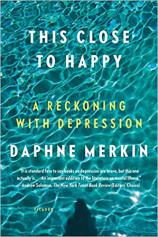Reading Group Guide
Discussion Questions
This Close to Happy: A Reckoning with Depression

INTRODUCTION
The acclaimed author Daphne Merkin has been hospitalized three times --- once when she was a child for her torrential crying jags, once for post-partum depression, and once after the death of her mother. And she has been trying to throw off the burden of chronic depression all her life. Yet despite her suffering, she has managed to be a prolific author, and with THIS CLOSE TO HAPPY, she is on a mission to open up the conversation about depression, to eliminate the taboo around this subject.
Capturing what it feels like to suffer from clinical depression in a way that speaks to both the sufferers and the onlookers to the suffering, whether friends or family, THIS CLOSE TO HAPPY raises essential questions about the mysteries of the mind. We hope that the following topics will enrich your discussion.
QUESTIONS AND TOPICS FOR DISCUSSION
1. How did the book enhance your understanding of depression? What does Daphne Merkin’s experience tell us about the impact of nature versus nurture on the psyche?
2. In chapter 4, the author writes, “The very presence of money in someone’s background tends to evoke envy and irritation... ‘What does she know of real suffering?’...and elicits a certain disbelief about the possibility of other kinds of privation.” Before reading about Merkin’s life, were you skeptical that someone from such a wealthy family could suffer such anguish?
3. As you read about Merkin’s lifetime of therapists and prescriptions, what did you make of the role of modern psychiatry?
4. In crystalline prose, Merkin describes the allure of suicide. How did you react to the logic of her thinking?
5. How did your image of Merkin’s mother shift from chapter to chapter? What fed Merkin’s fantasy that Ursula would rescue her?
6. How was Merkin affected by her emotionally aloof father, Hermann, and by watching her mother pamper him?
7. Orthodox Judaism was an integral part of Ursula and Hermann’s identity. Why did all of their children except Daphne integrate their parents’ orthodoxy into their own identities? If you had been Daphne, would you have signed Hermann’s contract, agreeing to keep kosher in exchange for a luxurious home?
8. Merkin’s mother eventually said it was a mistake to hire the abusive housekeeper Jane, though Jane lived with the Merkins for the rest of her life. How was Jane able to assert so much control?
9. How does the relationship between Merkin and her brothers and sisters relate to her depression? What determines whether siblings take care of each other or become rivals?
10. Does the fact that Merkin’s parents were refugees from Nazi Germany explain their approach to parenting, or would the household have been run the same way regardless of their tragic family history?
11. How is Zoë’s perception of the world influenced by her mother’s state of mind?
12. What enables Merkin to be such a high-functioning writer?
13. As Merkin surveyed a literary landscape populated by writers who struggled with depression (evoked by her tattered Virginia Woolf doll), what did you observe about the relationship between language and mental illness?
14. Merkin was born in the 1950s. How have attitudes about the authenticity of women evolved in American culture since then?
15. In chapter 8, Merkin recalls the psychiatrist she saw in her 20s who dug up a note that she had written as an eight-year-old patient at Columbia Presbyterian Babies’ Hospital. In the note, young Merkin says that she is afraid to go home, and she wants to know why her mother is only nice to her when she is sick. What significant truths are revealed in those words?
16. Is there evidence of Merkin’s chronic depression in her recent essay collection THE FAME LUNCHES?
This Close to Happy: A Reckoning with Depression
- Publication Date: February 27, 2018
- Genres: Memoir, Nonfiction
- Paperback: 304 pages
- Publisher: Picador
- ISBN-10: 1250159296
- ISBN-13: 9781250159298








